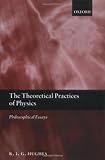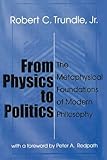The Theoretical Practices of Physics: Philosophical Essays
The Theoretical Practices of Physics: Philosophical Essays

R.I.G. Hughes presents a series of eight philosophical essays on the theoretical practices of physics. The first two essays examine these practices as they appear in physicists' treatises (e.g. Newton's Principia and Opticks) and journal articles (by Einstein, Bohm and Pines, Aharonov and Bohm). By treating these publications as texts, Hughes casts the philosopher of science in the role of critic. This premise guides the following 6 essays which deal with various concerns of philosophy of physics such as laws, disunities, models and representation, computer simulation, explanation, and the discourse of physics.

List Price: $ 75.00
Price: $ 56.83
From Physics to Politics: The Metaphysical Foundations of Modern Philosophy

Mass ideology is unique to modern society and rooted in early modern philosophy. Traditionally, knowledge had been viewed as resting on metaphysics. Rejecting metaphysical truth evoked questions about the source of "truth." For nineteenth-century ideologists, "truth" comes either from dominating classes in a progressively determined history or from a post-Copernican freedom of the superior man to create it. In From Physics to Politics Robert C. Trundle, Jr. uncovers the relation of modern philosophy to political ideology. And in rooting truth in human nature and Nature by modal reasoning, he resolves the problem of politicized truth.
Our concepts of scientific truth, logic, and necessity are essentially connected. Modern philosophy restricts our understanding of necessity to the political dreams and aspirations of Enlightenment intellectuals. As a result, these intellectuals refuse to acknowledge as factual or meaningful whatever is not intelligible within the practical goals of establishing science as a system of enlightened ideas. The effect of these ideas is that in our time metaphysical principles, speculative truths, our understanding of science, and the nature of logic have become subordinated to ideological dreams. Fascism, Nazism, Marxism, political correctness, and moral relativism are not historical aberrations but essential consequences.
Trundle's work is groundbreaking and daring, and his underlying thesis demonstrates why scientific truth demands a modal defense. The defense not only integrates science, ethics, and politics, but shows how "truth" may be ascribed to moral and scientific principles in contrast to a modern philosophical tradition. Since this tradition is the origin of political ideology, it has led to an irrational politicization of truth. The book will appeal particularly to those interested in political history, histories of philosophy, the philosophy of sciences, and ethics.
List Price: $ 24.95
Price: $ 22.42
No comments:
Post a Comment